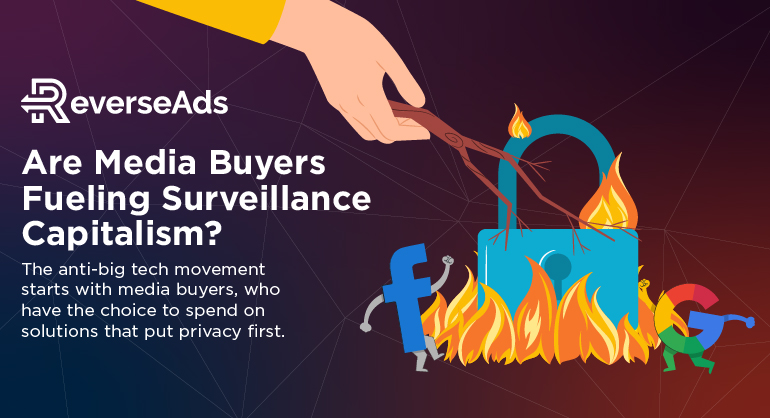Are Media Buyers Fueling Surveillance Capitalism?

The anti-big tech movement starts with media buyers, who have the choice to spend on solutions that put privacy first.
- The data-industrial complex is an emerging threat to our privacy and the advertising industry as a whole
- Media buyers are overspending on “walled-garden” ad products and not looking toward the open web where prospects spend 70% of their time
- The data-industrial complex is empowered by this overspending and can be weakened by forward thinking media buyers that choose to spend their budgets elsewhere
- The future of digital advertising should be privacy-first, putting the power of advertising into the hands of the people and not big tech.
Data is an increasingly valuable asset in the digital age. Its value transcends that of a resource that can be bought and sold. Data has literally become the lifeblood of organizations worldwide, as it drives growth, enables a competitive advantage, and optimizes operational processes.
Ultimately data is capitalized on in a myriad of ways, and global tech giants are hard at work monopolizing data systems and strengthening the data-industrial complex from their walled gardens across the web. But what is helping finance this power grab? Who helps make it possible for corporations like Google and Facebook to continually grow their data pools and intrude on their users’ privacy?
What if we told you that media buyers are among the largest contributors to the data-industrial complex? Let’s explore how this is possible and how the digital advertising arms of Google and Facebook secure their stranglehold on the world’s data.
Data Industrial Complex
The value of data has resulted in immense power and influence for the major big tech companies that collect and sell it. Now these same tech companies have run amuck and spawned what Tim Cook of Apple calls “The data-industrial complex.” Cook has recently taken a strong stance in opposition to the colossal industry that has grown from our ability to capture, aggregate, and monetize data. “[The data-industrial complex] degrades our fundamental right to privacy first, and our social fabric by consequence. [This contributes to an ecosystem of] rampant disinformation and conspiracy theories juiced by algorithms” said Cook.
The emergence of the data-industrial complex threatens our individual and collective privacy, and must be confronted head on. The most effective way to vanquish this global menace is to begin limiting its access to resources. To achieve this, we in the advertising industry should be looking at every opportunity we have to move ad budgets away from the tech giants and towards technology that prioritizes data privacy.

Walled Gardens vs. The Open Web
To understand the media buyer’s role in empowering the data-industrial complex, we need to examine how ad budgets are distributed across digital platforms. Most digital advertisers view Google and Facebook as the largest and most effective advertising solutions for their clients.
These two walled gardens have so much power and influence that they collect 59% of total global advertising budgets. Media buyers and agencies consistently fork over a majority of their client’s ad spend to these tech giants, but do they realize how little time is actually spent by users on these platforms?
When we look at time spent online, an entirely different story is being told. Buyers spend less than 30% of their time on Facebook and Google, and a vast majority of that time is not spent shopping or looking for products and services to purchase. 81% of buyers turn to the open web when looking for products to buy, and 37% of buyers are most likely to find relevant ads when on the open web.
These stats make it clear that media buyers are grossly overspending within Google and Facebook’s walled gardens, as the most receptive audience is traversing the open web.
Fuel on The Fire
Google and Facebook offer an array of valuable free tools on their platforms (Gmail, YouTube, Marketplace, Pages, etc.) The reason that both of these corporations can provide such powerful free tools is that they are paid for with the profits of their advertising solutions. The widespread use of Google Ads and Facebook Ads drives the profit of these corporations and fuels the fire of the data-industrial complex.
A vast majority of revenue generated by Google and Facebook originates from their advertising solutions. In 2020 alone, Google generated over $181 billion, and Facebook generated over $84 billion from their respective advertising products. Paid advertising is empowering the tech giants as they continue to collect and potentially exploit millions of users’ data.

The Role of the Media Buyer
Digital advertising is a multi-billion dollar industry, and media buyers manage a significant portion of the global ad spend. If the balance is restored to ad budgets, less money will flow through Facebook and Google’s walled gardens. Redistributing ad spend will not only reduce the power of the data-industrial complex, but it will also improve campaign performance for brands across considered purchase industries.
Media buyers everywhere have the choice to explore innovative advertising solutions instead of relying on outdated services from corporations that have demonstrated malicious intent. Putting pressure on Google and Facebook by properly allocating media budgets can transform data privacy issues and return the power of advertising to the people. For too long now, digital advertising has been about stuffing the pockets of the tech giants that have a monopoly on data. Still, a future exists in which advertising becomes helpful again.
ReverseAds is a transformative alternative to traditional search ads and was created as a privacy-first solution that takes on Google keyword by keyword. ReverseAds uses keyword-based targeting to serve ads in real-time, appearing everywhere a buyer goes across millions of high-quality websites. We see the writing on the wall and intend to help return balance to the digital advertising ecosystem. Stop fueling the fire of the data-industrial complex, and join ReverseAds as we take on big tech with the future of digital advertising.





